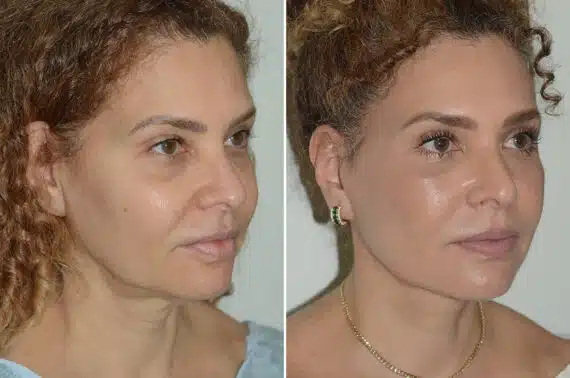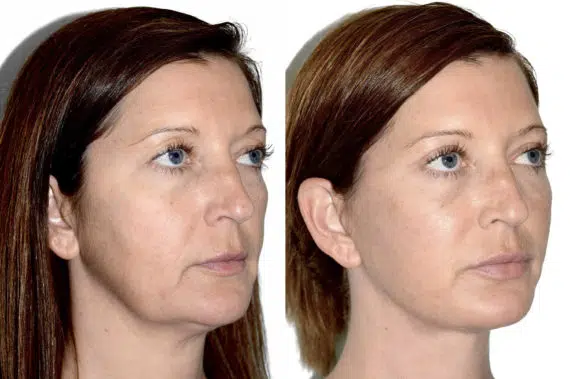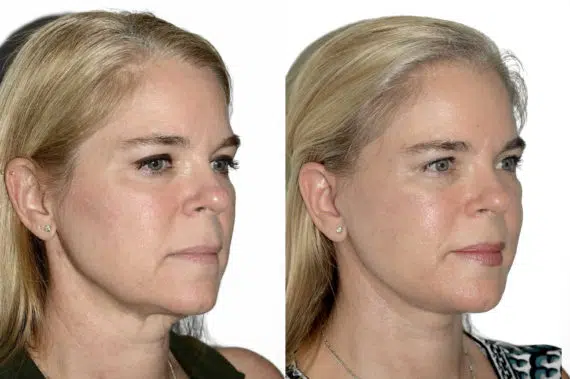Refining the face and neck with facelift surgery can restore youthful definition and balance in a natural way. Many patients considering facial rejuvenation wonder, how is a deep plane facelift done? This advanced approach works beneath the superficial layers to lift and reposition the deeper facial structures, creating long-lasting results that still look authentic and not “pulled.” In Miami, facial plastic surgeon Dr. Andres Bustillo is known for his mastery of the deep plane facelift technique, producing subtle, elegant results tailored to each patient’s unique features.

Quick Insights on the Deep Plane Facelift
- Dr. Bustillo’s signature deep plane facelift repositions the deeper facial tissues, not just the skin.
- Surgery typically lasts between four and six hours, depending on the individual.
- Proper incision placement and ligament release are key to achieving natural results.
- The deep plane facelift can address both face and neck aging in one procedure.
- Recovery takes about two to three weeks, with scars that are nearly invisible once healed.
What a Deep Plane Facelift Actually Addresses
The deep plane facelift is designed to correct the visible signs of facial aging that occur when deeper tissues of the face and neck begin to sag. These include jowls, a drooping jawline, flattened cheeks, and loose neck skin. Rather than simply tightening the surface skin, this facelift technique repositions the foundational facial muscles and connective tissue, restoring natural volume and structure.
Because the lift is performed at a deeper level, patients enjoy results that last longer and look more natural than traditional facelifts. The improvement extends from the midface down through the jawline and upper neck, creating harmony across the entire lower face.
How Deep Plane Facelift Surgery Works Step-by-Step
Anesthesia and Preparation for Deep Plane Facelift Surgery
Deep plane facelift surgery is typically performed under general anesthesia or local anesthesia with sedation to ensure patient comfort. Once anesthesia takes effect, Dr. Bustillo carefully plans the incision pattern based on the patient’s anatomy and hairstyle preferences.
Incision Plan and Facelift Scars
The success of facelift surgery depends greatly on incision design. Dr. Bustillo places incisions along natural curves—around the ear, within the hairline, and behind the tragus—so they blend seamlessly once healed. Poorly placed incisions are one of the main causes of visible scars after facelifts, which is why precision here is essential.
Entering the Deep Plane: Technique and Benefits
After making the incisions, Dr. Bustillo gently lifts the skin to access the deeper SMAS and muscular layers. He then enters the deep plane, the layer beneath the superficial musculoaponeurotic system (SMAS), to reposition the facial tissues that have descended with age. This approach allows him to release key ligaments and restore the natural contour of the cheeks and jawline without tension on the skin.
Strategic Ligament Release in Deep Plane Facelift Technique
The hallmark of the deep plane facelift technique is targeted release of the retaining ligaments that tether the facial muscles. When these ligaments are properly released, the deeper tissues can be repositioned smoothly, avoiding the “tight” look that can occur when tension is placed on the surface skin.
Repositioning the Face and Neck for Natural Results
Once the deep plane is accessed and released, Dr. Bustillo repositions and secures the underlying facial foundation to achieve a natural, youthful lift. By elevating the cheeks and tightening the neck simultaneously, the face and neck regain smoother contours and more balanced proportions.
Removing Excess Skin for Refined Facelift Results
After the deeper structures have been repositioned, any excess skin is trimmed away. Because the tension is now carried by the deeper tissues rather than the skin, healing is improved and results appear softer and more natural.
Closure and Healing: Fine Facelift Scars That Fade Naturally
Dr. Bustillo closes the incisions meticulously with fine sutures. By following the ear’s natural creases and the hairline, the scars are almost invisible once healed. Patients can wear their hair up or pulled back without concern for visible incision lines—a key benefit of a properly executed deep plane facelift.
Questions about your procedure?
Schedule a consultation with Dr. Andres Bustillo.
How Long Does Deep Plane Facelift Surgery Take?
Most deep plane facelift procedures take between four and six hours, depending on the patient’s anatomy, whether additional procedures are performed, and the extent of rejuvenation desired. The length of surgery reflects the precision required to release ligaments and reposition deeper tissues safely.
The Role of Fat Transfer
In some cases, Dr. Bustillo combines deep plane facelift surgery with facial fat transfer. Small amounts of a patient’s purified fat can be placed strategically in areas where volume loss contributes to aging, such as the temples, cheeks, or around the mouth. Fat transfer not only restores fullness but also improves skin quality over time due to the regenerative properties of the fat cells.
Deep Plane Facelift vs. SMAS Facelift Surgery: Technique and Results
While both techniques address sagging facial tissues, the deep plane facelift goes beneath the SMAS layer to release deeper attachments. A traditional SMAS facelift tightens or folds this layer but does not free it from its retaining ligaments. By operating below the SMAS, Dr. Bustillo achieves a more comprehensive lift of the midface, nasolabial folds, and neck. The result is a smoother, more natural rejuvenation that can last a decade or longer.

Who Is a Good Candidate for a Deep Plane Facelift?
Ideal candidates are healthy men and women in their 40s to 70s who want to address moderate to advanced facial sagging while maintaining natural facial expression. Good skin quality and realistic expectations are important. During a consultation, Dr. Bustillo evaluates facial anatomy, discusses goals, and explains whether the deep plane facelift, a neck lift, or other procedures may best meet those goals.
Why Choose Miami Deep Plane Facelift Surgeon Dr. Andres Bustillo?
Deep Plane Facelift surgeon in Miami Dr. Bustillo is a double board-certified facial plastic surgeon with over two decades of experience performing advanced facelift procedures. His deep understanding of facial anatomy and conservative, artistry-driven approach have earned him a reputation for achieving natural, long-lasting results. At his accredited Miami surgical center, patient safety and individualized care come first. Every deep plane facelift is customized to the patient’s unique bone structure, tissue elasticity, and aesthetic preferences.
Schedule a Consultation
If you’re considering facial plastic surgery in Miami, Dr. Bustillo can help you explore whether a deep plane facelift is the right choice for you. Schedule a private consultation to learn how his technique can rejuvenate your face and neck with natural results that reflect your best self.
FAQs About Deep Plane Surgery
Yes. Additional procedures such as blepharoplasty (eyelid surgery) or brow lift can enhance balance between the upper and lower face. Combining treatments can achieve a more harmonious overall rejuvenation with a single recovery period.
Small drains may be placed temporarily to minimize swelling and are usually removed within a day or two. Staples are rarely needed. For men, incisions are designed carefully to maintain natural beard lines.
Most patients return home the same day once they are alert and comfortable, though some may choose overnight observation for added comfort.
Dr. Bustillo specializes in revision facelift surgery, helping patients refine or restore results from previous procedures performed elsewhere. By redesigning incisions and addressing tension at the deeper level, he can refine contours and minimize visible scarring from earlier surgeries.
A deep plane facelift already lifts the neck area, but Dr. Bustillo may combine it with a formal neck lift or other facial procedures if extra tightening or contouring is needed.




